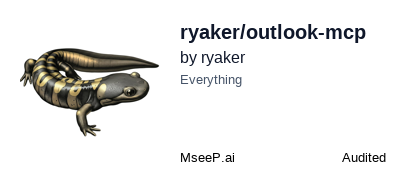About
This MCP server connects Claude to Outlook using OAuth 2.0 and the Microsoft Graph API, enabling email and calendar management—listing, searching, sending emails, and creating or updating events—through a modular, test‑friendly Node.js implementation.
Capabilities

Overview
The Modular Outlook MCP Server bridges Claude (or any MCP‑compatible AI assistant) with Microsoft Outlook through the Microsoft Graph API. It resolves a common pain point for developers: accessing rich Office 365 data—emails, calendar events, and more—directly from an AI interface without writing repetitive authentication or API plumbing code. By exposing Outlook capabilities as first‑class MCP tools, the server lets developers compose natural language prompts that can read inboxes, schedule meetings, or send messages, all while keeping authentication secure and stateful.
What the Server Does
At its core, the server implements a set of well‑structured MCP resources: email and calendar. Each resource exposes CRUD‑style tools such as , , , for emails, and , , , for calendar events. These tools translate high‑level intent into Microsoft Graph requests, handling OAuth 2.0 token acquisition, refresh, and error mapping behind the scenes. The modular layout—separate folders for authentication, calendar logic, email logic, and shared utilities—makes the codebase maintainable and extensible; adding a new Outlook feature (e.g., contacts) would involve creating a new module following the existing pattern.
Key Features Explained
- OAuth 2.0 Integration: Users authenticate via a browser redirect, after which the server securely stores and refreshes tokens. The module abstracts token lifecycle management, ensuring seamless long‑term access.
- Comprehensive Email Toolkit: Developers can list inbox items, perform keyword searches, read message bodies, and send new emails—all through concise MCP calls. The server handles pagination and OData filtering automatically.
- Robust Calendar Operations: Scheduling becomes trivial. Tools like or map directly to Graph’s event endpoints, while response handling (accept/decline) is wrapped in simple tool calls.
- OData Query Handling: The server includes helpers to build and escape OData queries, allowing developers to craft precise filters without dealing with syntax quirks.
- Test Mode: A mock data layer simulates API responses, enabling unit testing or prototyping without hitting live Outlook services.
Real‑World Use Cases
- Virtual Assistant for Scheduling: An AI can ask a user, “Schedule a meeting with the marketing team next Tuesday at 2 PM,” and the MCP server will create the event in Outlook, handling all authentication transparently.
- Inbox Automation: A developer can build a prompt that reads the latest email from a specific sender and auto‑responds with a templated message, all orchestrated by MCP calls.
- Cross‑Platform Workflow Integration: Teams using Claude on desktop or web can pull Outlook data into custom workflows—e.g., generating daily agendas, archiving old emails, or syncing calendar events to other services.
Integration with AI Workflows
Once the server is running, Claude’s MCP client can discover its tools via standard discovery endpoints. Developers add a single configuration line in the Claude Desktop config to point to the server’s URL. From there, prompts can invoke tools like or with JSON arguments. The server’s response is returned as structured data, enabling downstream AI reasoning or further tool chaining without additional parsing logic.
Unique Advantages
- Modularity: The clear separation of concerns allows teams to contribute new Outlook features without touching unrelated code.
- Security‑First Design: By handling OAuth flows internally and storing tokens securely, the server eliminates common pitfalls such as exposing credentials in client code.
- Developer‑Friendly Testing: The built‑in test mode removes dependency on Azure credentials during early development, accelerating iteration cycles.
In summary, the Modular Outlook MCP Server empowers developers to embed powerful Microsoft Outlook capabilities into AI assistants effortlessly. Its clean architecture, comprehensive toolset, and secure authentication model make it a practical choice for any project that needs to read or manipulate Outlook data through natural language interfaces.
Related Servers
Netdata
Real‑time infrastructure monitoring for every metric, every second.
Awesome MCP Servers
Curated list of production-ready Model Context Protocol servers
JumpServer
Browser‑based, open‑source privileged access management
OpenTofu
Infrastructure as Code for secure, efficient cloud management
FastAPI-MCP
Expose FastAPI endpoints as MCP tools with built‑in auth
Pipedream MCP Server
Event‑driven integration platform for developers
Weekly Views
Server Health
Information
Tags
Explore More Servers
Serverless MCP Server
Deploy a minimal MCP server on AWS Lambda
MCP Kafka Processor
Process events into Kafka topics with minimal setup
Magic-API MCP Server
Enterprise‑grade Magic‑API development with Model Context Protocol
Terraform Registry MCP Server
AI‑powered access to Terraform Registry data
MSSQL MCP Server
Secure, structured access to Microsoft SQL databases for AI assistants
VolcEngine TOS MCP Server
Intelligent query and retrieval for VolcEngine TOS storage